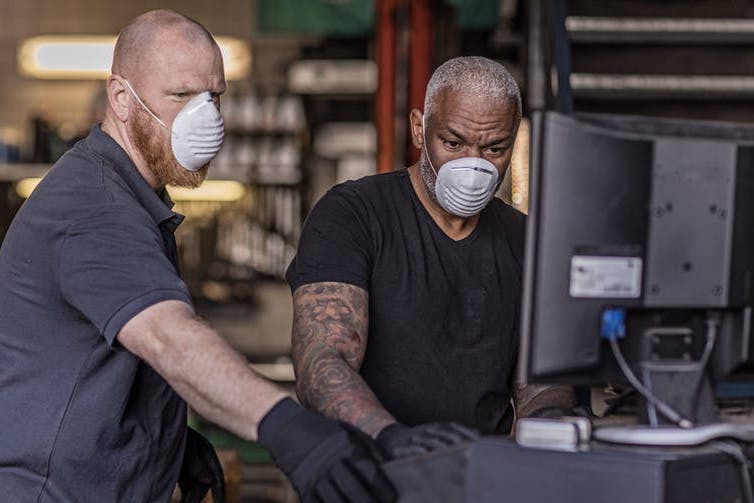Jasmine Kerrissey and Clare Hammonds report on their research, which provides some of the first data on the safety of essential workers during the pandemic.

Many low-wage workers are unable to practice social distancing. (Lorado/Getty Images)
By Jasmine Kerrissey and Clare Hammonds
The Conversation

 Low-wage essential workers are more likely to face dangerous working conditions and food insecurity than high-wage workers, even more so during the Covid-19 pandemic.
Low-wage essential workers are more likely to face dangerous working conditions and food insecurity than high-wage workers, even more so during the Covid-19 pandemic.
Our research provides some of the first data on the safety of essential workers during the pandemic.
Our findings suggest that Covid-19 is not the “great equalizer,” as New York Governor Andrew Cuomo once called it. In fact, inequality is getting worse.
We found that across income levels, roughly two-thirds of essential workers were unable to practice social distancing. Low-wage essential workers include grocery clerks, home health aides and delivery drivers, while high-wage workers include nurses, doctors and managers.
However, low-wage workers were two to three times more likely than high-wage workers – workers earning over $40/hour – to lack other forms of protections, including access to masks, hand sanitizer, training on how to prevent Covid-19 transmission or regular hand-washing opportunities.
Low Wages, High Rates of Infection
In our study, we surveyed over 1,600 essential workers in western Massachusetts, a hot spot for Covid-19, who were at work between April 17 and April 24, 2020. We wanted to learn about the experiences at work and at home of those who stayed on the job.
At the close of April, Massachusetts had the third-highest Covid-19 case count of all states.
We reached essential workers through targeted Facebook advertisements, a method that allows researchers to engage with emerging or hard-to-reach groups of people.
Although they do essential jobs, many essential workers are low-wage, earning under $20 an hour. While there are several ways to define low-wage, this is the definition we used in our study.
Infection risks & Food Insecurity
Not surprisingly, low-wage workers reported feeling less safe at work than high-wage workers. While 44 percent of high-wage workers reported not feeling safe, this percentage increased by 10 points to 54 percent for low wage workers.
Low wages were also a key indicator of food security. One in three low-wage respondents reported that they were unable to provide for themselves or their family in mid-April.
One of our survey respondents wrote, “We are risking infecting our family by working, and they don’t give us anything extra in our paychecks to be able to buy more food. What we earn is for paying rent, electricity, insurance, and the rest is barely enough to buy food.”
Others wrote that unemployment checks would be higher than they are paid as essential workers.
Over the past few months, Covid-19 has exposed and exacerbated inequities, including the safety of low-wage workers. From our perspective, safety is not just an issue for essential workers’ health. It fundamentally impacts our ability to reopen and stay open.
Jasmine Kerrissey is assistant professor of sociology and labor studies at the University of Massachusetts Amherst and Clare Hammonds is professor of practice and graduate program director at the University of Massachusetts Amherst.
This article is republished from The Conversation under a Creative Commons license. Read the original article.
Please Contribute to Consortium News’ 25th Anniversary Spring Fund Drive
Donate securely with  PayPal here.
PayPal here.
Or securely by credit card or check by clicking the red button:

Covid-19 has impacted the world in such a way that it seems the ways of living, cultures, businesses will change its dynamics. The unemployment is increasing and people are in great trouble.
Expats are going to face the worst impact because they will be hard hit by covid-19 by losing their jobs. It seems the expats living in middle east are going to face it in next few months. It is estimated that almost 1.2 million expats will lose their job in KSA alone.
So it is going to impact on middle east hard.
The inhumanity of humanity…..
And not only do the higher paid have better ppe, they don’t even need ppe in most cases, because they’re working AT HOME, that’s the best advantage of all that they enjoy. And if you narrowed it down to under 15$, the inequality would be even greater. Something that makes me lose faith in people is when I grocery shop and half of the customers don’t wear ppe, stupid for themselves, but the equivalent of giving the middle finger to store employees. While our government and business leaders have failed us, our own citizens are failing to be cautious also, it drives me crazy, the pandemic here is so much worse than it has to be, so much is and has been preventable, but it’ll never get better until everybody is on the same page. After all these months of information about how the respiratory virus spreads available to anybody, those who still go out regularly w/o ppe I can only assume are puppets of conservative media, or just really, really dumb, and perhaps both.